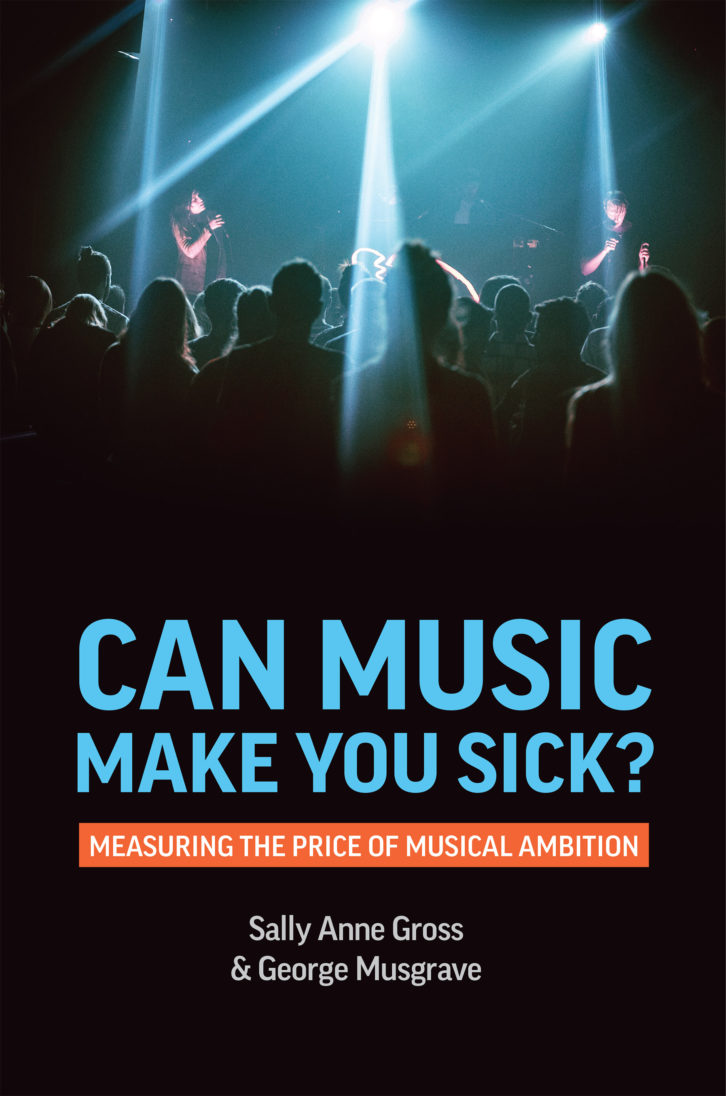
The image the public has of musicians is the curated one represented by the those at the top echelon of the profession. This image boasts power, confidence, wealth, health and control. Sally Gross and George Musgrave aren’t fooled. As a 30-year veteran of the music business, Gross, program director of MA Music Business Management at University of Westminster in London, England, and Musgrave, senior lecturer, module leader and an artist in his own right, have lifted the veil on what it is really like to be a musician in the current time in their book, Can Music Make You Sick?
“We wanted to represent musicians’ 24/7 working lives in this hyper-competitive, saturated market,” says Gross. “If musicians are following their dream, doing what they love, being fulfilled by what they do, and they are working themselves to death, their relationships are being destroyed, they’re having breakdowns and are in a bad way, what is this telling us?”

The book is the latest product of the research that Gross and Musgrave began four years ago. The first part, commissioned by the non-profit Help Musicians UK, was a survey administered to more than 2,000 musicians on how they felt about the working conditions of their chosen career and its impact on their mental well-being. The second part followed up by focusing on case studies to get to the core of the causes for the overwhelming reports of anxiety and depression uncovered by the initial survey.
“We’re not looking at the act of music creation, but musical ambition,” says Musgrave. “To unpack musical ambition, you have to understand the economic, the cultural, the social, and the interaction between the three.”
“Underlying those three is an emotional attachment that makes musicians feel strongly about music,” adds Gross. “What we find out from our interviews is that making music is therapeutic, but the pursuit of a musical career is traumatic.”
Gross and Musgrave summarize their findings in three “statuses.” The status of work: financial precarity and defining success; the status of value: largely, but not solely, determined by social media; and the status of relationships: personal and professional.
Music has shifted from being art to becoming content and data. The book reports staggering numbers of individuals creating and uploading music. There is an array of industries “built around encouraging and training musicians to share…and benefitting from their mental health issues.”
Speak to working musicians at any level, no matter how relentless their schedule is, they never express anything less than gratitude for being able to do music. They are the perfect example of a “smile economy” or disguising what you actually feel while you’re working. In the case of musicians, this is all the time.
“We use the term ‘techno positivism’ about people being positive about what technology brings into their lives,” says Musgrave. “What our interviewees communicated is almost an injunction to be positive at all times. To the outside world, everything must always appear great. It must look exciting, meritocratic, engaging, liberating.
“There is this idea of musicians being entrepreneurial liberal agents who are responsible for anything that happens, the ultimate reflective representation of meritocracy,” he adds. “If the best people rise to the top, what does that say about the people that don’t? ‘That’s on you. Should have worked harder, should have worked longer, should have worked faster.’ It’s really uncomfortable when someone comes along and says, ‘The work musicians are doing is important and meaningful. We need to think about how we can do things differently, because something clearly isn’t right here.’”

Gross and Musgrave don’t have all the answers. Their intention was to interrupt the never-ending positiveness, asking musicians to speak, keeping them anonymous, and listening to what they have to say. From these conversations, the suggestions they have come up with are reasonable starting points.
The first of these is having the appropriate mental health professionals on hand who understand musicians and their lifestyles. Second, establishing strong musicians unions and changing public policy which can serve to streamline the number of individuals that are identified as musicians and help stabilize the financial aspects of the job. Third, music companies taking on an active role in the maintenance of their artists’ mental, emotional and physical well-being. Fourth, education helping to develop diverse music practices so there is space and viability for more than just the top artists.
“The solutions are complex and multiple and they need to happen simultaneously,” says Gross. “We are talking to people who are working in an environment that is radically changing right in front of them. That’s strange and difficult to live through. You cannot pretend what’s happening is not happening. We’re not turning away. We’re looking at the cold face of music and asking difficult questions. There are real human lives involved. Unless we bring the real human story to the situation, it’s easy to sweep it aside.”



